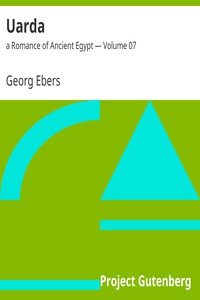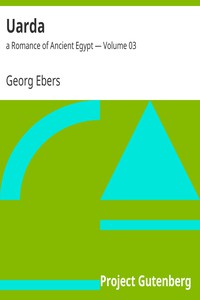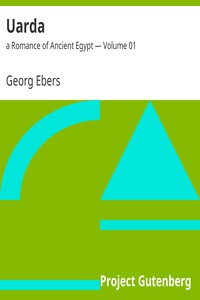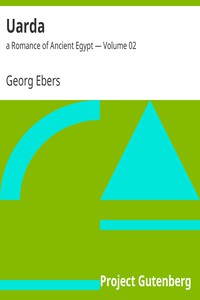Uarda : a Romance of Ancient Egypt — Volume 07 by Georg Ebers (i love reading books TXT) 📗

- Author: Georg Ebers
Book online «Uarda : a Romance of Ancient Egypt — Volume 07 by Georg Ebers (i love reading books TXT) 📗». Author Georg Ebers
"Yet another," said Ani. "Is there any way of destroying an enemy at a distance?"
"Certainly," said the witch. "Little people may do mean things, and great people can let others do things that they cannot do themselves. My story has stirred thy gall, and it seems to me that thou dost not love the poet Pentaur. A smile! Well then—I have not lost sight of him, and I know he is grown up as proud and as handsome as Assa. He is wonderfully like him, and I could have loved him—have loved as this foolish heart had better never have loved. It is strange! In many women, who come to me, I see how their hearts cling to the children of men who have abandoned them, and we women are all alike, in most things. But I will not let myself love Assa's grandchild—I must not. I will injure him, and help everyone that persecutes him; for though Assa is dead, the wrongs he did me live in me so long as I live myself. Pentaur's destiny must go on its course. If thou wilt have his life, consult with Nemu, for he hates him too, and he will serve thee more effectually than I can with my vain spells and silly harmless brews. Now let me go home!"
A few hours later Ameni sent to invite the Regent to breakfast.
"Do you know who the witch Hekt is?" asked Ani.
"Certainly—how should I notknow? She is the singer Beki—the former enchantress of Thebes. May I ask what her communications were?"
Ani thought it best not to confide the secret of Pentaur's birth to the high-priest, and answered evasively. Then Ameni begged to be allowed to give him some information about the old woman, and how she had had a hand in the game; and he related to his hearer, with some omissions and variations—as if it were a fact he had long known—the very story which a few hours since he had overheard, and learned for the first time. Ani feigned great astonishment, and agreed with the high-priest that Paaker should not for the present be informed of his true origin.
"He is a strangely constituted man," said Ameni, "and he is not incapable of playing us some unforeseen trick before he has done his part, if he is told who he is."
The storm had exhausted itself, and the sky, though covered still with torn and flying clouds, cleared by degrees, as the morning went on; a sharp coolness succeeded the hot blast, but the sun as it mounted higher and higher soon heated the air. On the roads and in the gardens lay uprooted trees and many slightly-built houses which had been blown down, while the tents in the strangers' quarter, and hundreds of light palm- thatched roofs, had been swept away.
The Regent was returning to Thebes, and with him went Ameni, who desired to ascertain by his own eyes what mischief the whirlwind had done to his garden in the city. On the Nile they met Paaker's boat, and Ani caused it and his own to be stopped, while he requested Paaker to visit him shortly at the palace.
The high-priest's garden was in no respect inferior in beauty and extent to that of the Mohar. The ground had belonged to his family from the remotest generations, and his house was large and magnificent. He seated himself in a shady arbor, to take a repast with his still handsome wife and his young and pretty daughters.
He consoled his wife for the various damage done by the hurricane, promised the girls to build a new and handsomer clove-cot in the place of the one which had been blown down, and laughed and joked with them all; for here the severe head of the House of Seti, the grave Superior of the Necropolis, became a simple man, an affectionate husband, a tender father, a judicious friend, among his children, his flowers, and his birds. His youngest daughter clung to his right arm, and an older one to his left, when he rose from table to go with them to the poultry-yard.
On the way thither a servant announced to him that the Lady Setchem wished to see him.
"Take her to your mistress," he said.
But the slave—who held in his hand a handsome gift in money—explained that the widow wished to speak with him alone.
"Can I never enjoy an hour's peace like other men?" exclaimed Ameni annoyed. "Your mistress can receive her, and she can wait with her till I come. It is true, girls—is it not?—that I belong to you just now, and to the fowls, and ducks, and pigeons?"
His youngest daughter kissed him, the second patted him affectionately, and they all three went gaily forward. An hour later he requested the Lady Setchem to accompany him into the garden.
The poor, anxious, and frightened woman had resolved on this step with much difficulty; tears filled her kind eyes, as she communicated her troubles to the high-priest.
"Thou art a wise counsellor," she said, "and thou knowest well how my son honors the Gods of the temple of Seti with gifts and offerings. He will not listen to his mother, but thou hast influence with him. He meditates frightful things, and if he cannot be terrified by threats of punishment from the Immortals, he will raise his hand against Mena, and perhaps—"
"Against the king," interrupted Ameni gravely. "I know it, and I will speak to him."
"Thanks, oh a thousand thanks!" cried the widow, and she seized the high-priests robe to kiss it. "It was thou who soon after his birth didst tell my husband that he was born under a lucky star, and would grow to be an honor and an ornament to his house and to his country. And now —now he will ruin himself in this world, and the next."
"What I foretold of your son," said Ameni, "shall assuredly be fulfilled, for the ways of the Gods are not as the ways of men."
"Thy words do me good!" cried Setchem. "None can tell what fearful terror weighed upon my heart, when I made up my mind to come here. But thou dost not yet know all. The great masts of cedar, which Paaker sent from Lebanon to Thebes to bear our banners, and ornament our gateway, were thrown to the ground at sunrise by the frightful wind."
"Thus shall your son's defiant spirit be broken," said Ameni; "But for you, if you have patience, new joys shall arise."
"I thank thee again," said Setchem. But something yet remains to be said. I know that I am wasting the time that thou dost devote to thy family, and I remember thy saying once that here in Thebes thou wert like a pack-Horse with his load taken off, and free to wander over a green meadow. I will not disturb thee much longer—but the Gods sent me such a wonderful vision. Paaker would not listen to me, and I went back into my room full of sorrow; and when at last, after the sun had risen, I fell asleep for a few minutes, I dreamed I saw before me the poet Pentaur, who is wonderfully like my dead husband in appearance and in voice. Paaker went up to him, and abused him violently, and threatened him with his fist; the priest raised his arms in prayer, just as I saw him yesterday at the festival—but not in devotion, but to seize Paaker, and wrestle with him. The struggle did not last long, for Paaker seemed to shrink up, and lost his human form, and fell at the poet's feet—not my son, but a shapeless lump of clay such as the potter uses to make jars of."
"A strange dream!" exclaimed Ameni, not without agitation. "A very strange dream, but it bodes you good. Clay, Setchem, is yielding, and clearly indicates that which the Gods prepare for you. The Immortals will give you a new and a better son instead of the old one, but it is not revealed to me by what means. Go now, and sacrifice to the Gods, and trust to the wisdom of those who guide the life of the universe, and of all mortal creatures. Yet—I would give you one more word of advice. If Paaker comes to you repentant, receive him kindly, and let me know; but if he will not yield, close your rooms against him, and let him depart without taking leave of you."
When Setchem, much encouraged, was gone away, Ameni said to himself:
"She will find splendid compensation for this coarse scoundrel, and she shall not spoil the tool we need to strike our blow. I have often doubted how far dreams do, indeed, foretell the future, but to-day my faith in them is increased. Certainly a mother's heart sees farther than that of any other human being."
At the door of her house Setchem came up with her son's chariot. They saw each other, but both looked away, for they could not meet affectionately, and would not meet coldly. As the horses outran the litter-bearers, the mother and son looked round at each other, their eyes met, and each felt a stab in the heart.
In the evening the pioneer, after he had had an interview with the Regent, went to the temple of Seti to receive Ameni's blessing on all his undertakings. Then, after sacrificing in the tomb of his ancestors, he set out for Syria.
Just as he was getting into his chariot, news was brought him that the mat-maker, who had sawn through the masts at the gate, had been caught.
"Put out his eyes!" he cried; and these were the last words he spoke as he quitted his home.
Setchem looked after him for a long time; she had refused to bid him farewell, and now she implored the Gods to turn his heart, and to preserve him from malice and crime.
CHAPTER XXXI.Three days had passed since the pioneer's departure, and although it was still early, busy occupation was astir in Bent-Anat's work-rooms.
The ladies had passed the stormy night, which had succeeded the exciting evening of the festival, without sleep.
Nefert felt tired and sleepy the next morning, and begged the princess to introduce her to her new duties for the first time next day; but the princess spoke to her encouragingly, told her that no man should put off doing right till the morrow, and urged her to follow her into her workshop.
"We must both come to different minds," said she. "I often shudder involuntarily, and feel as if I bore a brand—as if I had a stain here on my shoulder where it was touched by Paaker's rough hand."
The first day of labor gave Nefert a good many difficulties to overcome; on the second day the work she had begun already had a charm for her, and by the third she rejoiced in the little results of her care.
Bent-Anat had put her in the right place, for she had the direction of a large number of young girls and women, the daughters, wives, and widows of those Thebans who were at the war, or who had fallen in the field, who sorted and arranged the healing herbs. Her helpers sat in little circles on the ground; in the midst of each lay a great heap of fresh and dry plants, and in front of each work-woman a number of parcels of the selected roots, leaves, and flowers.
An old physician presided over the whole, and had shown Nefert the first day the particular plants which he needed.
The wife of Mena, who was fond of flowers, had soon learnt them all, and she taught willingly, for she loved children.
She soon had favorites among the children, and knew some as being industrious and careful, others as idle and heedless:
"Ay! ay!" she exclaimed, bending over a little half-naked maiden with great almond-shaped eyes. "You are mixing them all together. Your father, as you tell me, is at the war.





Comments (0)